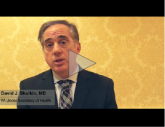Few fireworks are expected as confirmation hearings begin for David J. Shulkin, MD, for secretary of the Department of Veterans Affairs. Dr. Shulkin, who served as under secretary of health during the Obama administration, has widespread support from veteran service organizations, Democrats, and Republicans.
Related: Shulkin: VA "Not a Political Issue”
“We ask for the speedy confirmation of Dr. David Shulkin,” Randy Reeves, president of the National Association of State Directors of Veterans Affairs wrote in a letter to committee members. “As we all know, Dr. Shulkin is an accomplished physician and leader in healthcare. Most importantly, I think, he has been an important leader in the team that has effected the largest (positive) transformation in VA’s history. We can all agree there is still work ahead and we are confident that David Shulkin will be a great leader for VA, serve our veterans well and continue the MyVA Transformation.”
One of the likely topics in the hearing will be in the impact of the federal hiring freeze implemented by the Trump administration. The Acting Secretary of Veterans Affairs Robert Snyder recently released a memo that insisted that the freeze will not affect many categories of VA employees. The VA will exempt frontline personnel at VA medical centers, outpatient clinics, community-based outpatient clinics, and health centers who “it deems necessary for public health and safety,” Snyder said in a statement. As VA Secretary Nominee, Dr. Shulkin recently told Federal Practitioner, there are currently 45,000 openings at the VA for frontline medical positions.
Related: Shulkin Addresses APRN Rule, Health Care Vacancies, and Access
Recognizing the important role the VA plays in “training the nations health care providers,” the memo also exempted personnel involved in training and residency programs.
Those positions have proven to be difficult to fill. According to an investigation by National Public Radio (NPR) and local member stations, even an infusion of $2.5 billion from the Veterans Choice and Accountability Act of 2014, which was meant to help VA medical centers with the most urgent wait time problems, has not helped. “New hires weren’t sent to VA hospitals with the longest wait times,” NPR reported, “and the VA medical centers that got new hires were not more likely to see improved wait times.”
According to the NPR report, about 13% of the candidates for VA positions withdraw before they are hired due to the “months-long lag time after they are hired.”
Related: Get to Know the Trump Administration VA Secretary Nominee
